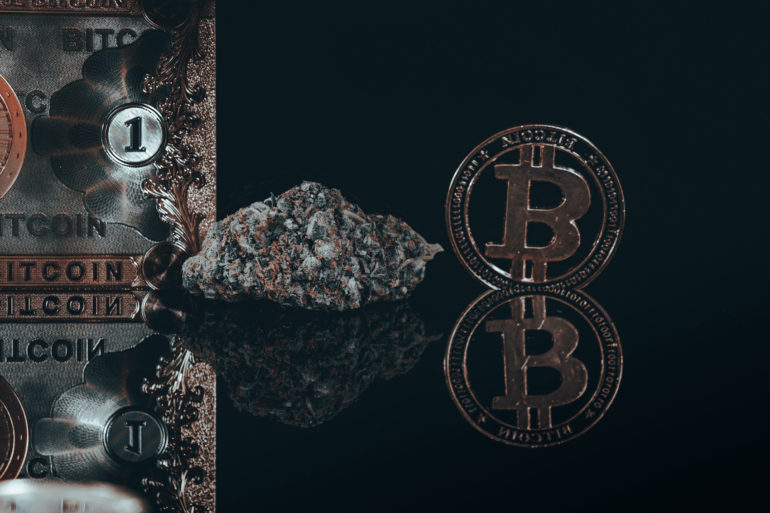Are you a Bitcoin user looking to buy CBD or cannabis products without needing the federal banking system? Great! Then look no further. We’ve scoured the internet to find the very best cannabis, CBD, and delta-8 companies in and out of the US that accept Bitcoin and other major cryptocurrency payments.
TL;DR
- You can find a few CBD and delta-8 THC companies and marketplaces accepting Bitcoin and crypto in the US, UK, and Europe.
- Bitcoin’s main benefit is it offers you a safe, secure, and anonymous payment alternative to federal banks that shy away from the cannabis industry — great news for CBD customers and businesses!
- One major downside of Bitcoin for companies is the heavy taxes — all transactions are taxed, which can increase business costs dramatically.
- A small number of marijuana dispensaries also accept Bitcoin payment.
CBD companies accepting Bitcoin and other types of cryptocurrency

While Bitcoin and other cryptocurrency payment options aren’t yet common in the CBD industry, here are some CBD companies opting to integrate crypto payment services and technology.
- Plain Jain
- Secret Nature
- Kush Queen
- Toast
- Endoca
- Industrial Hemp Farms
- Highland Pharms
- Difiori
- Pharma Hemp
- Rhizo Sciences
- Sol CBD
- Organic CBD Nugs
- Ghost Vapors
- American Green
- CannaAid
- Kandy Girl
- Hemp Depot
- Arete Hemp
International CBD companies accepting Bitcoin and other cryptocurrency payments
To all you international CBD shoppers looking to pay with Bitcoin, there are a few CBD companies accepting cryptocurrency payments outside of the US.
- Infinity CBD (UK)
- CBD Shopy (UK)
- CBD Star (UK)
- Herts Hemp (UK)
- Orange County CBD (UK)
- Golden Green (Switzerland)
CBD and Bitcoin are the new rebels with a cause

Despite being two very different industries offering two very different things, CBD and Bitcoin have one distinct similarity: they were born to rebel against the status quo.
CBD’s presence in the market is a giant middle finger to the long-standing pharmaceutical industry. Big Pharma overlords see the CBD industry and hemp-derived CBD products as a major threat to their bottom lines, offering a non-intoxicating, non-addictive, and powerful alternative to pharma-based medicines, particularly prescription opioids.
Likewise, Bitcoin is a direct response to the federal banking system, a system many believe fails to serve the people’s interests. The decentralized nature of Bitcoin and other major cryptocurrencies means federally-controlled banking institutions are no longer needed to mediate payment transactions. Instead, they offer fast, secure, and anonymous transactions without disproportionately high transaction fees.
How Bitcoin and CBD are a match made in heaven
Despite hemp and hemp-derived CBD being federally legal under the Farm Bill 2018, federal banking institutions remain skeptical of anything related to cannabis, even if the CBD is sourced from legal hemp.
The problem here is cannabis and CBD companies are finding it increasingly difficult to set up merchant accounts or get financing from major banks.
Thankfully, Bitcoin offers a viable solution. No centralized banks are required to process or mediate payment transactions, instead relying solely on the decentralized Bitcoin network.
The downside of Bitcoin payments for cannabis companies
On the business side of things, Bitcoin and other cryptocurrencies seem almost faultless. They’re anonymous, secure, fast, and viable alternatives to the federal banking system. However, they can also be a nightmare to deal with, especially when it comes to taxes.
Bitcoin isn’t a real currency nor is it real money, at least not in the eyes of the IRS. Instead, the IRS views all cryptocurrencies as property and a profitable investment.
The problem with this is Bitcoin gets the same tax treatment as any other investment and is subject to income and capital gains tax when traded, exchanged, or spent. Bitcoin payments are also taxed.
If a marijuana dispensary receives multiple Bitcoin payments per day, the business costs increase quite rapidly and in a short period of time. This is why many dispensaries and online CBD stores don’t typically offer cryptocurrency payment options.
Are there any delta-8 companies accepting Bitcoin payments?
Yes. There is one notable delta-8 THC company accepting Bitcoin. D8 Holdings, a leading delta-8 producer with offices in Hong Kong, announced it will start accepting Bitcoin, Ethereum, and Dogecoin payments. A free pack of delta-8-infused gummies will also be handed out to customers paying with these cryptocoins.
According to the company’s press release, D8.co will begin integrating Bitpay later this year, all transactions will be settled in Dogecoin, and you’ll be able to trade them for delta-8 vape carts, disposables, and gummies as long as you’re above the age of 21.
Other delta-8 vendors accepting Bitcoin payments:
Do marijuana dispensaries accept Bitcoin?
Yes. There are a few marijuana dispensaries accepting Bitcoin but they’re difficult to find.
Most marijuana dispensaries in the US only accept cash or mobile app payments. Debit and credit card payment options do not exist, simply because the banking system is federally regulated, marijuana is federally illegal, and financial banking institutions could risk losing their license if they offer payment services to illegal companies.
There are two marijuana dispensaries openly accepting Bitcoin and other cryptocurrency payment options.
The first is Ohana Cannabis based in Emeryville, California. The dispensary openly accepts Bitcoin and other cryptocurrencies as legitimate payments. Ohana also became the first dispensary to accept a cryptocurrency payment from a city official, who used Bitcoin Cash and Fed’s LBA token to make the purchase.
The second marijuana dispensary to allow Bitcoin payments is Helping Hands located in Boulder, Colorado. The dispensary was the first-of-its-kind to accept Bitcoin payments for recreational and medical cannabis in the state.
Do marijuana delivery services accept Bitcoin?
No, there are currently no weed delivery services that accept crypto payments.
Are there marijuana cryptocurrencies?
While Bitcoin, Dogecoin, Ethereum, and Litecoin are used across several different industries, developers decided to create cryptocurrencies specifically designed for the CBD and cannabis industries.
Launched way back in 2014, just as the crypto scene was starting to evolve into what it is today, Potcoin (POT) is the oldest cannabis cryptocurrency. Based in Colorado and created by three entrepreneurs living in Canada, this cryptocurrency aims to not only provide a decentralized form of banking but also become the gold standard payment within the cannabis industry. The supply of PotCoin is 420 million coins, which was inspired by the cannabis celebration date 4/20.
Only a few months after PotCoin came CannabisCoin, a peer-to-peer cryptocurrency that promised the same as PotCoin insofar as making financial transactions between customers and marijuana dispensaries easier. Unfortunately, the crypto’s success has dwindled, paling in comparison to its PotCoin rival.
Dopecoin was created in early 2014 by a guy named Adam Howell, who also goes by the nickname “Dopey”. His vision for DopeCoin was to create a Silk Road cryptocurrency, providing marijuana users access to a modern and secure avenue of doing business in 2021. There are no transaction fees or usage costs.
CannaCoin was developed in 2014 by a group of NWGT.org medical cannabis forum members as a response to the “cash only” nature of cannabis dispensaries and the 2008 Global Financial Crisis. According to its Wiki website, CannaCoin is “is geared toward use within the medical and recreational cannabis community worldwide as a medium of exchange, a unit of account, and a store of value for cannabis and cannabis related goods and services”.
Unlike the other cannabis cryptos listed above, HempCoin isn’t primarily designed for customers purchasing cannabis products from dispensaries. Instead, it’s the first and only cannabis-related cryptocurrency facilitating fast, secure payment transactions between farmers, distributors, and consumers.
Tokes is one of the newer cannabis cryptos. It was created by Michael Wagner & Gabriel Allred in 2016, two years after Potcoin, DopeCoin, and CannaCoin, and runs on the Waves blockchain. Tokes is designed to provide the cannabis and CBD industries a legitimate banking solution. All transactions take less than 30 seconds and cost less than 1 cent per transaction.
Closing thoughts: Will more cannabis and CBD companies accept Bitcoin payments in the future?
With CBD now the fastest-growing industry in the US, Bitcoin reaching into the thousands for a single coin, federal banks still not budging on the cannabis industry, and more crypto payment technology in development, we see a bright future ahead.
However, two of the main issues with crypto payments in the cannabis and CBD industries are the high fees and tax issues, both of which can be a huge financial burden. There’s also the problem of major banks shying away from the cannabis industry as a whole. This leaves companies stuck between a rock and a hard place.
Thankfully, cannabis and CBD companies might not be stuck for too long. The SAFE Banking Act (the Secure and Fair Enforcement Banking Act), which seeks to allow banks to provide financial service to licensed cannabis companies without federal prosecution, passed the House in March. If successful, CBD and cannabis companies will find it easier to get bank loans, open merchant accounts, and process debit and credit card payments.

